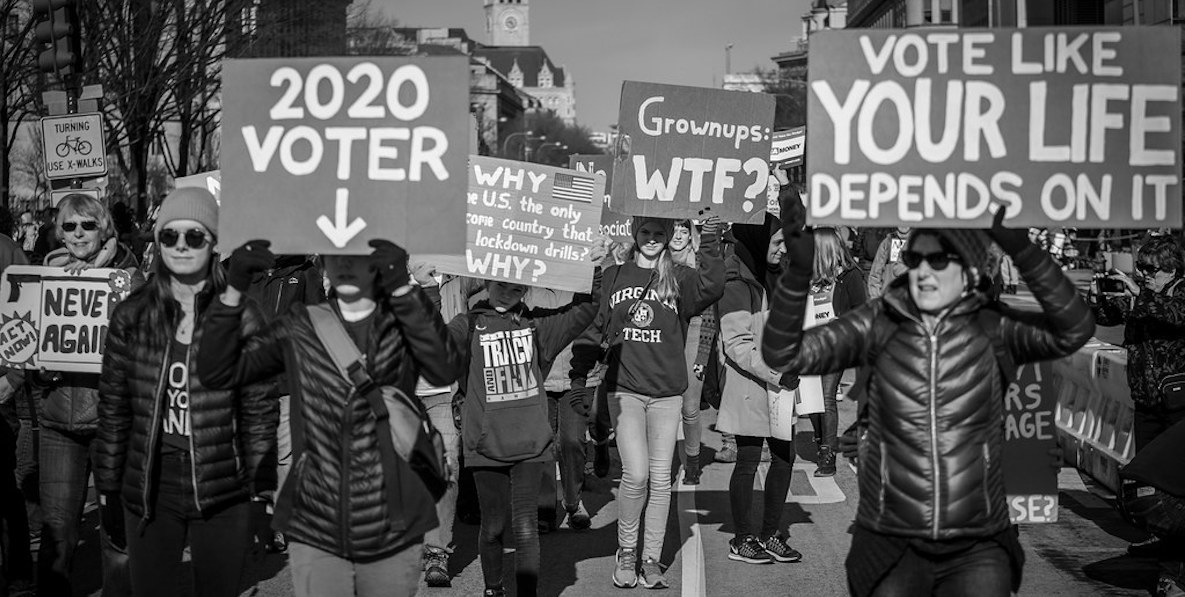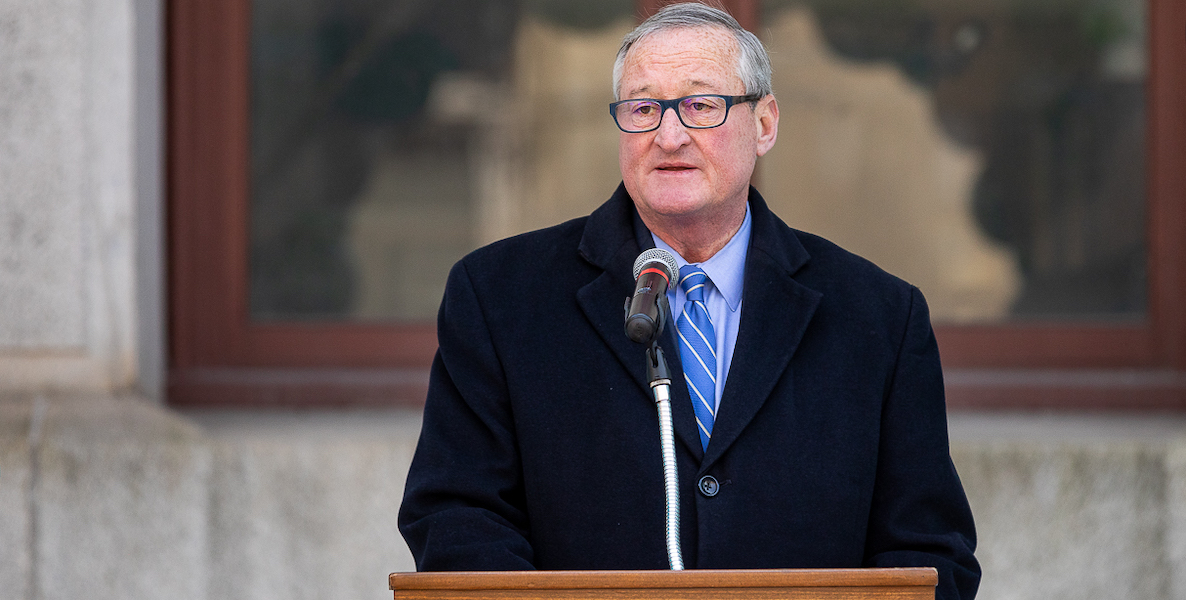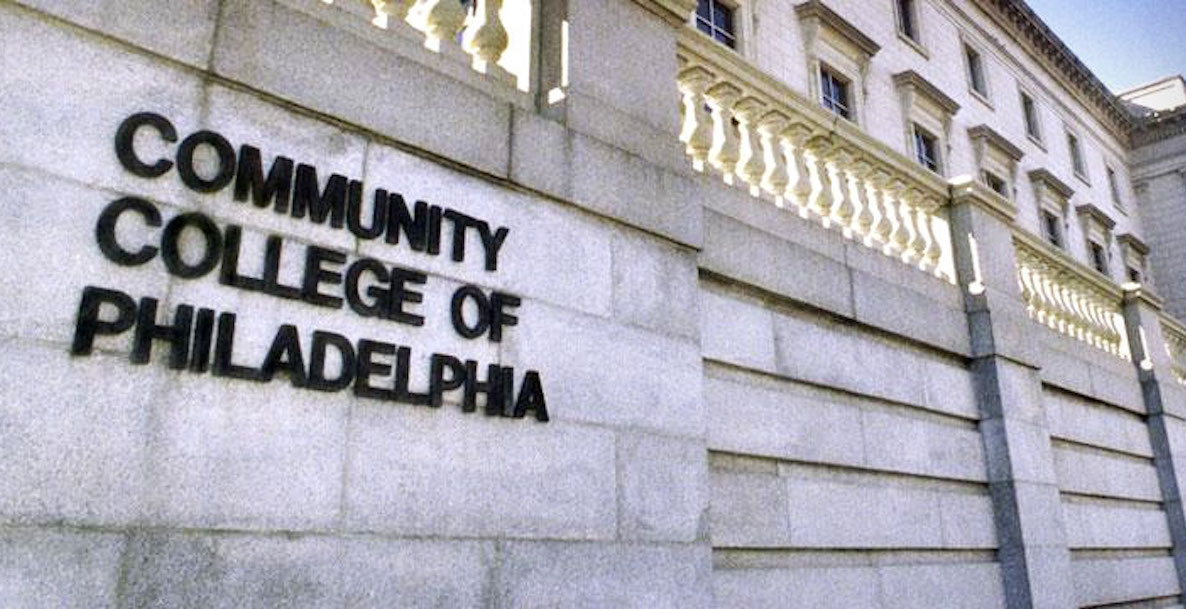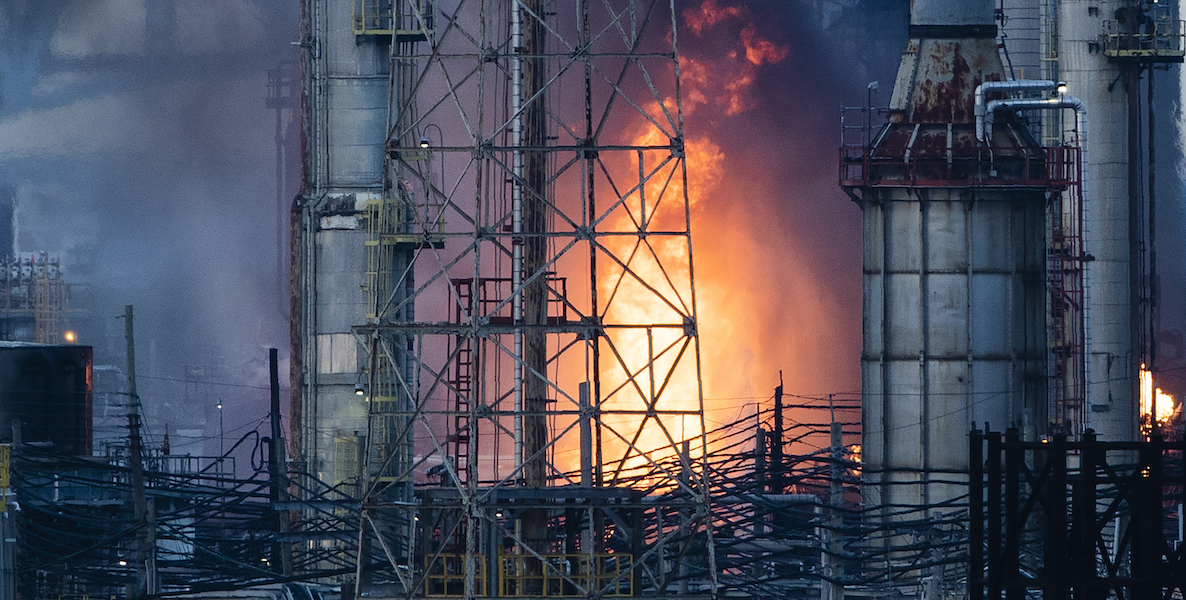The fireball resulting from Friday’s sudden and very large early morning explosion at the Philadelphia Energy Solutions (PES) refinery should be sending City Hall a somewhat karmic message: Maybe it’s time the city seriously reassess and immediately find ways to end its tangled relationship with gas.

Prefer the audio version of this story? Listen to this article in CitizenCast below:


The PES refinery was already the nation’s oldest and largest of its type, and the fire — happening just less than a year after the company’s post-bankruptcy restructuring — was, in many ways, predictable. The refinery had been racking up permit violations about which the city neglected to sound the alarm. Residents and activists have warned for years that the refinery is a stationary public health disaster and should have been closed long ago.
While there was, fortunately, no loss of life from last week’s fire, there has long been concern that the PES refinery has contributed to high chronic disease rates in its surrounding neighborhoods. PhillyThrive, an environmental advocacy group, conducted a survey of neighboring residents in 2017 and found that over half of those polled had cancer, heart disease, or some form of respiratory illness. And whereas Philadelphia’s citywide asthma rate is 19 percent, it jumps to nearly 34 percent in the area around the PES refinery. The national asthma rate average is just eight percent.
Despite Mayor Kenney’s lofty environmental goals and City Council’s flimflam gestures to green causes (passing a plastic bag tax, for example, shortly after approving a natural gas plant), Philadelphia is content with surrounding itself in one big fog of carbon.
Last week’s fire is a timely embarrassment for City Hall on the heels of its recent, dare we say, negligent approval of expanded fossil fuel infrastructure throughout Philadelphia. Despite Philadelphia Mayor Jim Kenney’s lofty environmental goals and City Council’s flimflam gestures to green causes (passing a plastic bag tax, for example, shortly after approving a natural gas plant), Philadelphia is content with surrounding itself in one big fog of carbon.
Here are the facts: To date, this large Northeast U.S. corridor city has accepted the existence of three major fossil-fueled, methane-leaking, carbon-emitting plants spewing pollutants into the breathing air of its 1.6 million residents. Bad enough we already have the 1) now blown-up, existing, bankrupted, permit-violating Philadelphia Energy Solutions plant in South Philadelphia. But, added to that will be 2) a Council-approved $60 million Philadelphia Gas Works liquefied natural gas plant in Southwest Philly, as well as 3) SEPTA’s near-complete $27 million natural gas plant in North Philadelphia. And we might end up getting an additional 4) carbon pollution plant if PES successfully pimps a $120 million bogus “renewable energy” plant built by RNG Energy Solutions that (surprise) only spits out … more natural gas.
![]()
City leaders largely act like the problem of worsening air quality in Philadelphia doesn’t exist—even as authoritative, national reports routinely show Philly housing some of the dirtiest air among American cities. Just this past April, the American Lung Association’s 20th Annual 2019 Air Quality Report found that, compared to 2018, the “Philadelphia metro area experienced more unhealthy days of high ozone … earning the area an F grade and worsening its ranking from 24th- to 21st-worst in the country.” This fire just made the 2019 ranking worse.
Wary of the sticky branding and political optics of running a city with that kind of bad-air reputation, Kenney has masked himself as an urban green crusader, with a network of think tanks, summits, and fellow mayors obliging him. He was among 350 mayors to sign on to the Paris climate accord the Trump administration pulled out of. He’s had his Office of Sustainability develop a plan for the city to run completely on renewable energy by 2050. And in December, he signed a bill that gives Philly the authority to purchase nearly a quarter of its electricity from a 70-megawatt solar plant in Adams County, PA—more than two hours away.
This all makes Kenney look very pro-environment and progressive in the headlines. He just won re-election, so he’s in lame-duck good shape. It also supplies him with an endless stream of anti-Trump/anti-Republican rebukes while ranting about how D.C. and Harrisburg continue to put hurdles in the way of his plan for citywide progress. Indeed, city leaders will, near daily, call out President Trump for this or that atrocity, a typical fallback these days for Democratic politicians searching for public allies through common enemies.
Our large Northeast US corridor city has now accepted the existence of three major fossil-fueled, methane-leaking, carbon-emitting plants spewing pollutants into the breathing air of its 1.6 million residents.
But, in assessing two major issues—the continued complicity in allowing, without a fight, the existence of the high-profile polluting PES plant, and the construction of the PGW and SEPTA natural gas plants — city leaders are, in fact, being very Trumpian. The complacency shown by City Hall in dismissing the years-long impact of the PES plant is no different from Trump completely defanging the federal Environmental Protection Agency and engaging in wholesale regulatory roll-back. Fossil fuel producers like PES, knowing this, are taking complete advantage. Pushing through approvals for the building of gas plants in Southwest and North Philly is no different from Trump eliminating methane pollution rules, since both plants will mean insidious, invisible, and unhealthy methane appearing as a newly constant feature in a citywide menu of respiratory-killing, cancer-activating poisons.
Still, Chris Pulchasky, director of policy and strategic initiatives at the Mayor’s Office of Transportation, Infrastructure and Sustainability (OTIS), wants you to think that, as PlanPhilly reported, “The project could actually reduce particulate matter, nitrogen oxides and sulphur oxides. It is also estimated that the project will reduce carbon dioxide by 133,688 tons annually.”
Here’s the main problem with that: Wasn’t the City’s plan to eliminate carbon, not “reduce” it? How do you eliminate carbon if you’re still putting it in the air?
![]()
Secondly: Natural gas is about as bad a hustle as false-advertisement pitches for “clean diesel” and “clean coal.” You can’t honestly combine the words “natural” and “gas” in a sentence without giggling, because it’s a joke. There is no such thing. What does exist is the dangerous, immediate-term impacts of methane, which constantly leaks from natural gas production and makes the air more unbreathable and the climate hotter. Philly is getting hotter enough as it is. The Mayor and City Council want to add more methane to that?
As researchers discovered upon examining data from 700 plants nationwide “… the U.S. oil and gas industry is leaking 13 million metric tons of methane each year, which means the methane leak rate is 2.3 percent. This 60 percent difference between our new estimate and the EPA’s current one can have profound climate consequences.” Plus, none of what natural gas does is healthy for the environment or for us, as Vox’s David Roberts points out.
Kenney positions himself as such a green mayor, but is it all for show? As ecoWURD’s Malcolm Burnley points out, the city isn’t even tracking how bad its air quality is or how it impacts our most vulnerable communities.
All of which brings us back to the PES refinery. The city’s relationship with it over the years is a template for the negligent standard by which City Hall treats environmental injustices that are happening within plain sight. The PES refinery has languished and polluted over the years in the name of refinery jobs that are overwhelmingly held by non-Philly residents, and the lack of a city response should have been a hint that City Hall doesn’t value residential health. We should have known that city officials would eventually approve the SEPTA and PGW plants because, look, it’s not like they’ve applied any pressure on the PES refinery—the worst offender.
After all, the PES refinery is one of the most oxygen destroying plants in the NAACP’s 2017 Fumes Across the Fence Line report. It ranks 8th on a Top 10 list of those African American communities that have been hardest hit by natural gas pollution.
![]()
“The PES refinery is responsible for 72 percent of the toxic air emissions in Philadelphia, which contributes largely to a citywide childhood asthma rate that is more than two times the national average,” the NAACP researchers observed. “Toxins released from the refinery include ammonia, hydrogen cyanide, benzene, and sulfuric acid, which cause effects ranging from headaches to cancer.”
Philadelphia already ranks second in the state in terms of cancer rates per 100,000—nearly 542 per year—just behind Cameron County. Incidentally, as Pennsylvania touts itself as the second largest producer of natural gas in the country due to Marcellus Shale gas extraction, methane levels are skyrocketing in the northern part of the state, which might explain Cameron County’s higher cancer rates.
But Philly also has the morbid distinction of being ranked first among the state’s Top 10 cities with high annual cancer rates; lung and prostate cancers are the most prominent, and we remain on the Top 10 list for childhood cancer. The highest cancer mortality rates are in lower North Philadelphia. However, South Philadelphia is not too far behind, along with parts of Southwest, both in the proximity of the PES spread zone, thereby combining two massive portions of the city into the largest cancer alert area visible.
The correlation between dangerous PES emissions and the state of health in neighboring residential areas should be cause for alarm among city administrators and elected officials alike. But it’s not. Any conversation around the issue is marginalized or wrongly viewed as simply noise from fringe groups, such as PhillyThrive, which has attempted to revive the issue after years of neglect from City Hall, Harrisburg, and others. When attempting to get an explanation as to why PES’ health and environmental impacts remain unaddressed, Reality Check on WURD hasn’t gotten return calls, for example, from the state representative who oversees that district, State Rep. Maria Donnatucci.
Don’t hold out for any help from the city’s health department, which feigns an awkward shrug when confronted about the situation. “I’m not sure how much we can help with this,” Philly Public Health Department spokesperson James Garrow responded in an email to WURD’s Reality Check. “I’m not sure what you’re getting at with PES, but as for the Nicetown plant, there’s not much we can say. SEPTA applied for a permit for the generators with Air Management Services. AMS is required to follow federal, state, and local air regulations, so it approved the permit based on its compliance with these regulations and the results of its model. This is not a case where we debated whether or not to approve it; we were obligated based on longstanding state, federal, and local air regs.”
Instead of building more natural gas plants, why not take cues from Los Angeles Mayor Eric Garcetti, who recently dropped plans to rebuild existing coal-powered plants and simply moved to replace them with renewable energy sources by 2024?
Of course, AMS barely enforces “air regs” when it comes to the PES plant. Why would we expect it to do the same for the SEPTA plant?
Others get defensive or say there’s nothing they can do. “As legislators, we can’t just shut down a privately-operated refinery or company, that’s just unrealistic,” argued State Rep. Jordan Harris who randomly called in on the issue. On the local level, Councilman Kenyatta Johnson, whom PhillyThrive identified as unresponsive, told Reality Check that, “I don’t create gas. We just have to monitor it to the best of our ability.”
Meanwhile, the city’s Office of Sustainability had acknowledged, in its clean energy plan, that “… the refinery is the single-largest source of particulate emissions in the city and alone accounts for nearly 16 percent of Philadelphia’s carbon footprint, not including the fossil fuel products exported off-site.” But, even that downplays it when not backed by either follow-up action or constant oversight.
Kenney positions himself as such a green mayor — highlighted, yet again, by a keynote speaker slot at this week’s Green Sports Alliance — but, is it all for show? As ecoWURD’s Malcolm Burnley points out, the city isn’t even tracking how bad its air quality is or how it impacts our most vulnerable communities.
Instead of building more natural gas plants, why not take cues from Los Angeles Mayor Eric Garcetti, who recently dropped plans to rebuild existing coal-powered plants and simply moved to replace them with renewable energy sources by 2024? Garcetti’s full clean energy target of 2045 is even more ambitious than Kenney’s. True, L.A.’s three coal-fueled power plants are run by L.A. Water and Power, but at least they’re not reverting to natural gas like Philly.
It is true, as Rep. Harris said on Reality Check, that governments can’t just indiscriminately “shut down private companies.” But if such companies are poisoning the air and water supplied to residents, cities can hassle them through litigation or prosecution. Or, perhaps, by forcing them to repurpose or rebuild into renewable energy plants.
PES recently announced a $120 million investment in a fake “renewable energy” plant that actually produces … wait for it … more natural gas. What PES should be doing is building an actual, real renewable energy plant that could, conceivably, run on solar, wind or hydro–or a combination of all three.
If we know PES has violated more than two dozen operating permits under the Clean Air Act, then Philadelphia’s Air Management Division, along with other relevant agencies, should revoke the permits and constantly sue PES until it complies or cries uncle. Partnering up with advocacy groups and other nonprofits could help apply pressure, too. Back in 2015, the city settled with PES on permit violations for a total of just under $700,000. For all the suffering that residents have gone through, it sounds like Philly got stiffed.
The federal government might be dysfunctional at the moment, but Clean Air Act permits are an available tool at a city’s disposal. As the Environmental Integrity Project’s “Oil Refinery Permits Handbook” shows, “Clean Air Act permits issued to oil refineries are permits given to private companies by our government on behalf of us to pollute the air that we breathe. Public participation is a right, and effective participation makes a real difference in the quality and stringency of the permits under which refineries must operate. Better permits mean a cleaner global environment, as well as improved health and quality of life for the people who must live with the refineries in their backyards.”
In keeping PES open and approving the construction of two (maybe three) more natural gas plants, Philly is showing its real face as a truly dirty city. It’s a hard pivot away from the “green city” or “zero-carbon” image city leaders, particularly Mayor Kenney, have meticulously crafted over recent years. And it’s something that must stop soon before Philly ends up being a less livable city for everyone, including the ones gentrifying it. The PES fire serves as a warning. You can build all the bike lanes you want, but the mess left over from all this gas won’t be something anyone can clean up overnight.
AP Photo/Matt Rourke








